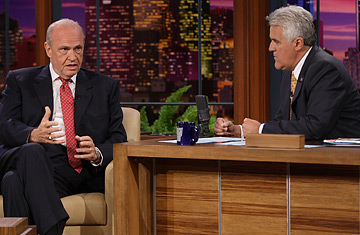
Former Senator Fred Thompson appears on the Tonight Show With Jay Leno September 5, 2007, where he announced that we would run for President.
The Tonight Show with Jay Leno is an unlikely place to launch a bid to become leader of the free world, but the former Tennessee Senator and Law and Order star Fred Thompson isn't the first 2008 presidential candidate to kick off his or her campaign in a non-traditional setting.
Rudy Giuliani announced his candidacy on Larry King Live; Mike Huckabee did it on Meet the Press; Hillary Clinton formally threw her hat in the ring via a short Web video; and John Edwards made his intentions known with off-the-cuff remarks in the front yard of a devastated house in New Orleans' Ninth Ward.
But while the medium used to announce candidacies may be changing, the message is about the same as it was the day humans began rejecting clubbing in favor of persuasion as a way to seek positions of leadership. For the most part, it always includes three key points:
1) Here's my story.
2) My story is our nation's story.
3) Here's what I think the next chapter of that story should be.
Thompson wasn't subtle in hitting points one and two: "My story is an American story," he began. He then proceeded to chart his life from teenage father of three and minimum-wage worker to lawyer, Watergate counsel, Senator, actor and now new father of two small kids. In this, the Tennessee Senator follows a well-worn rhetorical path.
This year, Barack Obama recounted in his announcement speech how he ended up taking a job as a community organizer in inner-city Chicago, and from there went on to the Illinois State Senate, underscoring his outsider credentials and institutional accomplishments. Hillary Clinton reintroduced herself to voters as someone who "grew up in a middle-class family in the middle of America" — not inside the Beltway — and quickly recapped her accomplishments in Arkansas, the White House and the Senate. Mitt Romney — successful businessman, head of the 2002 Olympics and former Massachusetts governor — structured his whole speech around the notion that American needs "innovation and transformation" and explained how "throughout my life, I have pursued innovation and transformation."
In years past, former New York Knick and New Jersey Senator Bill Bradley talked about being a "small-town boy" from Missouri; Gary Hart launched his 1984 bid by describing himself "as the son of Dust Bowl farm parents who never finished high school"; and in the opening paragraph of his announcement in 1974, Jimmy Carter said "I am a farmer, an engineer, a businessman, a planner, a scientist, a governor and a Christian." In this approach, biography is destiny.
After reminding the audience that he was actually a lawyer and didn't just play one on TV, Thompson demonstrated what seems to be the key reason politicians procreate, so they can ask the question: "What kind of country are our children and grandchildren going to grow up in?" Having small children is also what apparently motivates Chris Dodd to run for President, who announced he's running "not just as a public servant, but as a parent, the father of two young daughters — ages five and 22 months." In this sense, both are lucky to have fathered two small children late in life, because it just doesn't pack the same emotional punch to ask what kind of world we're going to create for my son, the stockbroker, or my daughter, the research chemist. But bringing up children is also a useful and frequently used way to get to point three: What should the next chapter in our nation's history look like?
It's at this point that candidates face a choice — to go the thematic or programmatic route.
Some candidates choose the latter and embark on a whirlwind tour of the policy world, weighing in on just about every issue and offering specific, programmatic details. It's what John Kerry did in 2004, John McCain and Al Gore did in 2000, and Dick Gephardt did in 1988 — to just name a few. It's not a coincidence that all these candidates were legislators, and none of them won.
Thompson took a different — and generally more successful — tack, delivering an announcement speech that was built on a thematic framework. Mentioning but offering no specifics on the major issues of the day, Thompson instead pledged his fealty to "sound conservative First Principles," and articulated the principles that would guide his campaign: "security, prosperity, and the unity of our country."
This approach echoes Bill Clinton's announcement speech in 1992, which also was built around three themes: opportunity, responsibility and community. And like Clinton and Ronald Reagan in 1980, Thompson also explicitly offered his views on the proper role of government and his theory of governing. In fact, his may be the only announcement speech this year to offer a view on the wonky topic of federalism.
Whether Thompson ultimately makes it to the office those two held is an open question. But what we do know is that no matter how much he, or any other candidate, uses late-night TV or YouTube, there are time-tested templates — like the announcement speech — that will never change.
Kenneth Baer is the founder of Baer Communications, LLC. Jeff Nussbaum is a principal of the communications firm West Wing Writers. Both were speechwriters for Vice President Al Gore
